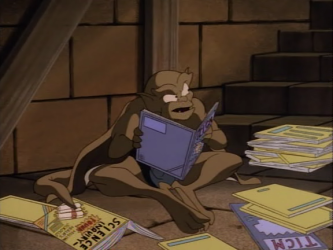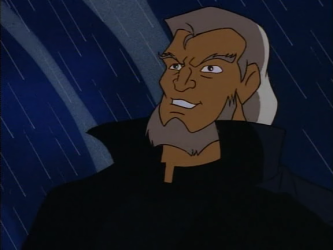Episode 2x04 [A Lighthouse in a Sea of Time]
Today’s discussion post covers one of the most - in my opinion, at least - thought provoking episodes in the series: A Lighthouse in a Sea of Time. Never afraid of tackling big issues, and having already covered gun crime in Deadly Force, the writers moved on to illiteracy here.
If you have any problems or any questions, let one of the moderators know. You can leave a comment on this post, or you can contact us via PM or our Bronx-guarded mailbox if you want a bit more privacy. In the meantime, enjoy the discussion!

A Lighthouse in a Sea of Time has a rather unusual opening. Instead of seeing a familiar friend or a familiar villain, we see two strangers - archeologists, it seems - climbing through a cave. When I first watched the episode, I wasn’t particularly gripped by this - typically, I wanted to know where the clan was! - but, as an adult, I appreciate it a lot more. I like the tension, I like the lyre and I definitely like the point about the “seeker of knowledge”.
In fact, now I think about it, I distinctly remember being under-whelmed by the entire episode. Not because it felt preachy - on the contrary, the message about reading seemed so natural to me that I didn’t realise it even needed to be said - but because I don’t think it quite clicked. Fortunately, that’s what rewatchs are for.
Points of Interest
(As usual, I’m just pointing out a handful of things. Feel free to give your opinions on what I’ve said or add points of your own. Or, better yet, both!)
Reading


“The written word is all that stands between memory and oblivion. Without books as our anchors we are cast adrift, neither teaching nor learning. They are windows on the past, mirrors on the present and prisms reflecting all possible futures. Books are lighthouses erected in the dark sea of time.”
I really love that quote.
In his memo for the episode, Greg stresses that the episode isn’t about teaching Hudson and Broadway to read. It’s about making them - and, through them, the audience - want to read.
When the episode opens, we see two very different takes on illiteracy. Hudson is ashamed because thinks he should have learned already, which is, as Greg’s memo points out, the main cause of continued illiteracy among adults. The opportunity to learn is there, but they’re too ashamed to take it. Broadway, on the other hand, can’t see the point of reading. He lives an exciting life and, in the dull moments, he had television and the world of cinema to fall back on. Reading, to him, is something utterly irrelevant. Since there is a ‘rent the movie rather than read the book’ mentally among a lot of people - my little brother, who is always astonished to discover that that the books of films he’s enjoyed are actually exciting, is a case in point - I think this is something an unfortunate number of teenagers would probably agree with.
At first, I get the impression that Broadway is trying a little too hard to convince the rest of the clan - and himself - that reading is pointless. Hudson is eager to stay quiet, but I think there is a definite sense of desperation when it comes to Broadway. It makes his transformation all the better. I love that Hudson and Broadway don’t merely resolve to read the scrolls. They resolve to read them themselves.
Macbeth

“You were there?”
“I’m old, but I’m not that old!”
Be honest, was Macbeth an expected or an unexpected bad guy? Did you, like the gargoyles, automatically assume that Xanatos was behind the theft? (Which is a fair assumption to make, I think. He does seem to have a hand in everything else going on in their world. Although, as Greg points out in his ramble, the ‘previously’ recap does spoils things and give the game away.)
At this point in the series, Macbeth is still an unknown entity. His motives are unclear and Greg’s episode note refers to his code of honour. Do you think he has one? In one moment, he’s preparing to use the spells on Broadway. The next, he’s letting the gargoyles take the scrolls and go. He calls the Goliath a “monster” when he’s angry, but, before that, he congratulates Broadway on his spirit. In short, he’s nothing if not conflicted.
I also have to draw attention to the ‘Macbeth Theme’ in the soundtrack. It’s brilliantly atmospheric, isn’t it?
Hudson and Robbins

“Something about your voice made me think you were a soldier once.”
Although he doesn’t appear very often, Robbins is a very important character. This is, really, the first time we see Hudson striking out on his own. He’s always struggled to adjust to his new time - especially when compared to the rest of the clan - and I was very happy to see him making a friend.
Apparently, his original role was going to be very different. The memo dubs him ‘St Jeffrey’, and he was going to be an Arthurian expert and one of Goliath’s favourite authors. I’m very glad he was toned down. It allowed for a perfectly natural friendship between him and Hudson, and made his talks about reading seem less … staged, I suppose.
(Another thing that struck me during the rewatch was the nature of their introduction. Hudson feels the need to explain his name. A way of showing that he still finds this time - and the conventions the clan have had to adopt - a bit confusing?)
Episode Roundup
Gargoyles Defying the Laws of Physics: 4
Star Trek Voices: 1
Dramatic Awakening Scenes: 1
New Minor Returning Characters:
- Macbeth’s Henchpeople
- Lydia Duane
- Arthur Morwood-Smith
- Jeffrey Robbins
- Gilly
Feel free to let me know if you think of any other categories I should add!
Handy Links
- GargWiki
- Greg’s Episode Ramble
- The Metamorphosis Memo
If you have any problems or any questions, let one of the moderators know. You can leave a comment on this post, or you can contact us via PM or our Bronx-guarded mailbox if you want a bit more privacy. In the meantime, enjoy the discussion!

A Lighthouse in a Sea of Time has a rather unusual opening. Instead of seeing a familiar friend or a familiar villain, we see two strangers - archeologists, it seems - climbing through a cave. When I first watched the episode, I wasn’t particularly gripped by this - typically, I wanted to know where the clan was! - but, as an adult, I appreciate it a lot more. I like the tension, I like the lyre and I definitely like the point about the “seeker of knowledge”.
In fact, now I think about it, I distinctly remember being under-whelmed by the entire episode. Not because it felt preachy - on the contrary, the message about reading seemed so natural to me that I didn’t realise it even needed to be said - but because I don’t think it quite clicked. Fortunately, that’s what rewatchs are for.
Points of Interest
(As usual, I’m just pointing out a handful of things. Feel free to give your opinions on what I’ve said or add points of your own. Or, better yet, both!)
Reading


“The written word is all that stands between memory and oblivion. Without books as our anchors we are cast adrift, neither teaching nor learning. They are windows on the past, mirrors on the present and prisms reflecting all possible futures. Books are lighthouses erected in the dark sea of time.”
I really love that quote.
In his memo for the episode, Greg stresses that the episode isn’t about teaching Hudson and Broadway to read. It’s about making them - and, through them, the audience - want to read.
When the episode opens, we see two very different takes on illiteracy. Hudson is ashamed because thinks he should have learned already, which is, as Greg’s memo points out, the main cause of continued illiteracy among adults. The opportunity to learn is there, but they’re too ashamed to take it. Broadway, on the other hand, can’t see the point of reading. He lives an exciting life and, in the dull moments, he had television and the world of cinema to fall back on. Reading, to him, is something utterly irrelevant. Since there is a ‘rent the movie rather than read the book’ mentally among a lot of people - my little brother, who is always astonished to discover that that the books of films he’s enjoyed are actually exciting, is a case in point - I think this is something an unfortunate number of teenagers would probably agree with.
At first, I get the impression that Broadway is trying a little too hard to convince the rest of the clan - and himself - that reading is pointless. Hudson is eager to stay quiet, but I think there is a definite sense of desperation when it comes to Broadway. It makes his transformation all the better. I love that Hudson and Broadway don’t merely resolve to read the scrolls. They resolve to read them themselves.
Macbeth

“You were there?”
“I’m old, but I’m not that old!”
Be honest, was Macbeth an expected or an unexpected bad guy? Did you, like the gargoyles, automatically assume that Xanatos was behind the theft? (Which is a fair assumption to make, I think. He does seem to have a hand in everything else going on in their world. Although, as Greg points out in his ramble, the ‘previously’ recap does spoils things and give the game away.)
At this point in the series, Macbeth is still an unknown entity. His motives are unclear and Greg’s episode note refers to his code of honour. Do you think he has one? In one moment, he’s preparing to use the spells on Broadway. The next, he’s letting the gargoyles take the scrolls and go. He calls the Goliath a “monster” when he’s angry, but, before that, he congratulates Broadway on his spirit. In short, he’s nothing if not conflicted.
I also have to draw attention to the ‘Macbeth Theme’ in the soundtrack. It’s brilliantly atmospheric, isn’t it?
Hudson and Robbins

“Something about your voice made me think you were a soldier once.”
Although he doesn’t appear very often, Robbins is a very important character. This is, really, the first time we see Hudson striking out on his own. He’s always struggled to adjust to his new time - especially when compared to the rest of the clan - and I was very happy to see him making a friend.
Apparently, his original role was going to be very different. The memo dubs him ‘St Jeffrey’, and he was going to be an Arthurian expert and one of Goliath’s favourite authors. I’m very glad he was toned down. It allowed for a perfectly natural friendship between him and Hudson, and made his talks about reading seem less … staged, I suppose.
(Another thing that struck me during the rewatch was the nature of their introduction. Hudson feels the need to explain his name. A way of showing that he still finds this time - and the conventions the clan have had to adopt - a bit confusing?)
Episode Roundup
Gargoyles Defying the Laws of Physics: 4
Star Trek Voices: 1
Dramatic Awakening Scenes: 1
New Minor Returning Characters:
- Macbeth’s Henchpeople
- Lydia Duane
- Arthur Morwood-Smith
- Jeffrey Robbins
- Gilly
Feel free to let me know if you think of any other categories I should add!
Handy Links
- GargWiki
- Greg’s Episode Ramble
- The Metamorphosis Memo